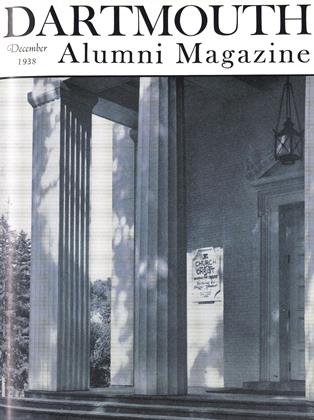EXCERPTS FROM THE INAUGURAL ADDRESS OF W. H. COWLEY '24
IN HIS inaugural address at Hamilton College, October 29, President W. H. Cowley '24 placed himself in direct opposition to the educational theories advanced by President Hutchins of Chicago against whose espousal of "intellectualism" Dr. Cowley advanced his own belief in "holism," his term for the "development of the student as a whole personality," a concept toward which Dartmouth's educational policy is aimed. This in a sense defines the distinction in aims as between the university and the undergraduate college. In his address, after praising Dr. Hutchins as an interesting and provocative educational thinker, Dr. Cowley said, "No college president can avoid taking a position in one camp or the other. Without further ado I take such a position: I align myself with the traditional British-American philosophy of education that the purpose of the college is the training of the whole student, not of his mind alone.
"I take this stand because it is my deep conviction that in education and in living intelligence is not enough.
"Intelligence is not enough because thinking is only part of living; because students come to college not only to train their minds but also for the enrichment of their lives as people; because college youths need the advice and direction of mature and experienced adults who understand their problems; because as expressed in the motto of Hamilton College they seek to know themselves.
NATURE OF HOLISM
"Intelligence is not enough because selfknowledge is emotional and social and spiritual as well as intellectual; because not only the student's mind comes to college but also his body; because,, as any alumnus will testify, the lessons in human relations learned from one's fellow students are frequently at least as important as the lessons learned from books and professors; because college is not only an intellectual enterprise but also a social and spiritual environment; because society expects not only intelligence from college graduates but also civilized attitudes, matured emotions and cultivated character."
Dr. Cowley emphasized his belief that holism did not stand against high intellectual performance, but included it. He said:
"Holism comes from the Greek word 'holos' meaning whole. The word whole means wholeness of mind and body and spirit. The extreme which produces the country-club college is just as reprehensible as the extreme which produces the intellectual treadmill."
 View Full Issue
View Full Issue
More From This Issue
-
 Sports
SportsFootball Review
December 1938 By BILL CUNNINGHAM '19 -
 Class Notes
Class Notes1929*
December 1938 By F. WILLIAM ANDRES -
 Class Notes
Class Notes1918*
December 1938 By ERNEST H. EARLEY -
 Article
ArticleProposed Mew Webster Hall
December 1938 -
 Article
ArticlePublications Decision by Trustees
December 1938 -
 Class Notes
Class Notes1912*
December 1938 By CONRAD E. SNOW
Article
-
 Article
ArticleResolution
April 1934 -
 Article
ArticleNew Institute Director
MARCH 1983 -
 Article
ArticleA No Vote
Mar/Apr 2004 -
 Article
ArticleVISITING VOICES
MAY | JUNE 2016 By —NOVELIST ZADIE SMITH -
 Article
ArticleThe Undergraduate Chair
March 1954 By DICK MAY '54 -
 Article
ArticleDARTMOUTH'S CHIEF ENGINEER RESIGNS
March 1919 By HOMER EATON KEYES

